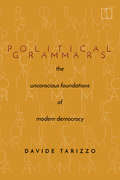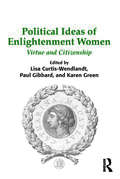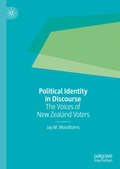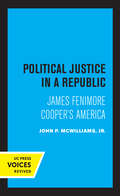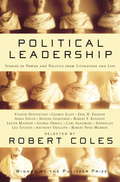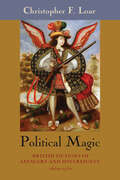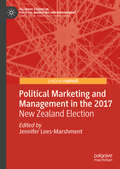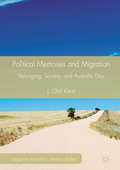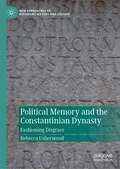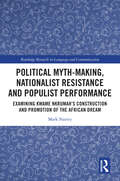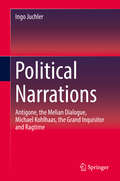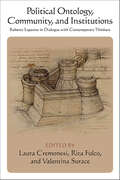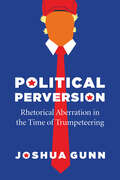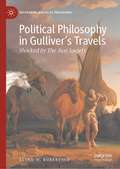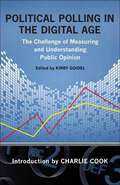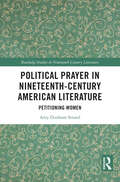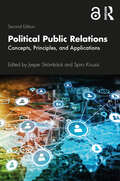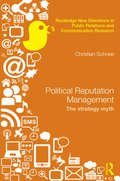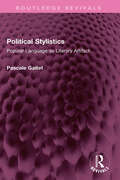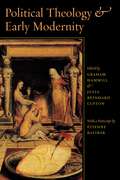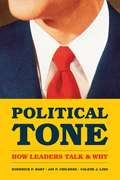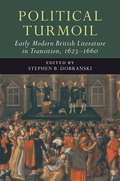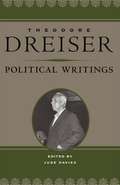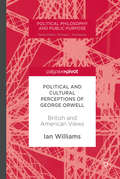- Table View
- List View
Political Grammars: The Unconscious Foundations of Modern Democracy (Square One: First-Order Questions in the Humanities)
by Davide TarizzoDo we need to be a "people," populus, in order to embrace democracy and live together in peace? If so, what is a populus? Is it by definition a nation? What exactly do we mean by nationality? In this book, Davide Tarizzo takes up the problem of modern democratic, liberal peoples—how to define them, how to explain their invariance over time, and how to differentiate one people from another. Specifically, Tarizzo proposes that Jacques Lacan's theory of the subject enables us to clearly distinguish between the notion of personal identity and the notion of subjectivity, and that this very distinction is critical to understanding the nature of nations whose sense of nationhood does not rest on any self-evident identity or pre-existent cultural or ethnic homogeneity between individuals. Developing an argument about the birth and rise of modern peoples that draws on the American Declaration of Independence of 1776 and the French Declaration of the Rights of Man and the Citizen of 1789 as examples, Tarizzo introduces the concept of "political grammar"—a phrase that denotes the conditions of political subjectification that enable the enunciation of an emergent "we." Democracy, Tarizzo argues, flourishes when the opening between subjectivity and identity is maintained. And in fact, as he compellingly demonstrates, depending on the political grammar at work, democracy can be productively perceived as a process of never-ending recovery from a lack of clear national identity.
Political Ideas of Enlightenment Women: Virtue and Citizenship
by Karen Green Lisa Curtis-Wendlandt Paul GibbardThis edited collection showcases the contribution of women to the development of political ideas during the Enlightenment, and presents an alternative to the male-authored canon of philosophy and political thought. Over the course of the eighteenth century increasing numbers of women went into print, and they exploited both new and traditional forms to convey their political ideas: from plays, poems, and novels to essays, journalism, annotated translations, and household manuals, as well as dedicated political tracts. Recently, considerable scholarly attention has been paid to women’s literary writing and their role in salon society, but their participation in political debates is less well studied. This volume offers new perspectives on some better known authors such as Mary Wollstonecraft, Catharine Macaulay, and Anna Laetitia Barbauld, as well as neglected figures from the British Isles and continental Europe. The collection advances discussion of how best to understand women’s political contributions during the period, the place of salon sociability in the political development of Europe, and the interaction between discourses on slavery and those on women’s rights. It will interest scholars and researchers working in women’s intellectual history and Enlightenment thought and serve as a useful adjunct to courses in political theory, women’s studies, the history of feminism, and European history.
Political Identity in Discourse: The Voices of New Zealand Voters
by Jay M. WoodhamsThis book takes an innovative view of language and politics, charting the terrain of political identities and discourses in New Zealand through detailed linguistic analysis of interactions with its voters. The author first sets out the geographical and sociopolitical context, examining how the constraints of a small and isolated country interact with widespread social values such as egalitarianism. He then delves into the multiple nature of identities and explores how Kiwis form their political selves through informal talk with others and in engagement with their physical and discursive surroundings. In doing so, the author provides an in-depth exploration of New Zealand political culture, identity and discourse, and sheds light on how we use language to become political people. This book will be of interest to linguists, political scientists and sociologists working with discourse analysis.
Political Journalism in Comparative Perspective
by Erik Albæk Arjen van Dalen Nael Jebril Claes H. de Vreese Erik Albæk Arjen Van Dalen Nael Jebril Claes H. de VreesePolitical journalism is often under fire. Conventional wisdom and much scholarly research suggest that journalists are cynics and political pundits. Political news is void of substance and overly focused on strategy and persons. Citizens do not learn from the news, are politically cynical, and are dissatisfied with the media. This book challenges these assumptions, which are often based on single-country studies with limited empirical observations about the relation between news production, content, and journalism's effects. Based on interviews with journalists, a systematic content analysis of political news, and panel survey data in different countries, this book tests how different systems and media-politics relations condition the contents of political news. It shows how different content creates different effects, and demonstrates that under the right circumstances citizens learn from political news, do not become cynical, and are satisfied with political journalism.
Political Justice in a Republic: James Fenimore Cooper's America
by John P. McWilliams Jr.This title is part of UC Press's Voices Revived program, which commemorates University of California Press’s mission to seek out and cultivate the brightest minds and give them voice, reach, and impact. Drawing on a backlist dating to 1893, Voices Revived makes high-quality, peer-reviewed scholarship accessible once again using print-on-demand technology. This title was originally published in 1972.
Political Leadership: Stories of Power and Politics from Literature and Life
by Robert ColesFrom ancient times to the present day, here are indispensable insights on political power and leadership as expressed in the novels, plays, and poetry of the world's greatest artists and intellectuals. Adapted from a course taught at Harvard by Pulitzer Prize--winning author Robert Coles, Political Leadership features scenes, stories, and speeches that pierce to the core of how and why some lead and others follow. In Felix Holt, the Radical, George Eliot observes that progressive reformers can be even more self-serving than their conservative counterparts; in The Prime Minister, Anthony Trollope suggests that honest men must cope with the corruption of politics-or leave leadership entirely to the crooked; and the works of Nadine Gordimer and George Orwell reveal that those who overturn tyrants often envy their power and repeat their mistakes. Anyone trying to understand today's confused and violent world will be both challenged and inspired by this unique and important collection. From the Trade Paperback edition.
Political Magic: British Fictions of Savagery and Sovereignty, 1650-1750
by Christopher F. LoarPolitical Magic examines early modern British fictions of exploration and colonialism, arguing that narratives of intercultural contact reimagine ideas of sovereignty and popular power. These fictions reveal aspects of political thought in this period that official discourse typically shunted aside, particularly the political status of the commoner, whose “liberty” was often proclaimed even as it was undermined both in theory and in practice. Like the Hobbesian sovereign, the colonist appears to the colonized as a giver of rules who remains unruly.At the heart of many texts are moments of savage wonder, provoked by European displays of technological prowess. In particular, the trope of the first gunshot articulates an origin of consent and political legitimacy in colonial showmanship. Yet as manifestations of force held in abeyance, these technologies also signal the ultimate reliance of sovereigns on extreme violence as the lessthan-mystical foundation of their authority.By examining works by Cavendish, Defoe, Behn, Swift, and Haywood in conjunction with contemporary political writing and travelogues, Political Magic locates a subterranean discourse of sovereignty in the century after Hobbes, finding surprising affinities between the government of “savages” and of Britons.
Political Marketing and Management in the 2017 New Zealand Election (Palgrave Studies in Political Marketing and Management)
by Jennifer Lees-MarshmentThis book reveals the market research, strategy, branding and communication behind the unpredictable 2017 New Zealand election result which saw Jacinda Ardern elected Labour leader just 8 weeks before the election to become Prime Minister. Utilising rich data sources that include a 250,000 Vote Compass survey and interviews with key political advisors, it explores the alignment of the policy of National, Labour, the Greens and NZ First with party supporters, demographic segments and undecided voters. It also analyses the leadership communication and branding of the leaders Bill English, Jacinda Ardern and Andrew Little, as well as the advertising by minor parties ACT, the Greens, United Future and the Maori Party. The book provides advice for practitioners, such as: focus on being responsive, communicate delivery competence, differentiate in policy and advertising, build an energetic and charismatic leader brand and be flexible when planning.
Political Memories and Migration: Belonging, Society, and Australia Day (Palgrave Macmillan Memory Studies)
by J. Olaf KleistThis book explores the relationship between political memories of migration and the politics of migration, following over two hundred years of commemorating Australia Day. References to Europeans’ original migration to the continent have been engaged in social and political conflicts to define who should belong to Australian society, who should gain access, and based on what criteria. These political memories were instrumental in negotiating inherent conflicts in the formation of the Australian Commonwealth from settler colonies to an immigrant society. By the second half of the twentieth century, the Commonwealth employed Australia Day commemorations specifically to incorporate new arrivals, promoting at first citizenship and, later on, multiculturalism. The commemoration has been contested throughout its history based on two distinct forms of political memories providing conflicting modes of civic and communal belonging to Australian politics and policies of migration. Introducing the concept of Political Memories, this book offers a novel understanding of the social and political role of memories, not only in regard to migration.
Political Memory and the Constantinian Dynasty: Fashioning Disgrace (New Approaches to Byzantine History and Culture)
by Rebecca UsherwoodThis book is an exploration of political memory and disgrace in the reigns of Constantine and his sons. It uses the conditions of the early to mid-fourth century to argue that the deconstruction of political legitimacy should be viewed, first and foremost, as a collective phenomenon, the result of the actions of a diverse range of people responding to political change. It also challenges many positivist and teleological narratives of the ‘Age of Constantine’. Shifting the focus from the emperor and his sons onto their rivals and opponents, the Constantinian dynasty is placed back into the messy and ambiguous political environment from which it emerged.
Political Myth-making, Nationalist Resistance and Populist Performance: Examining Kwame Nkrumah's Construction and Promotion of the African Dream (Routledge Research in Language and Communication)
by Mark NarteyUsing the socio-political discourse of Kwame Nkrumah, a pioneering Pan-Africanist and Ghana’s independence leader, Nartey investigates the notion of political myth-making in a context underexplored in the literature. He examines Nkrumah’s construction of a myth described in the book as the Unite or Perish myth (i.e. the idea of a ‘United States of Africa’ being a prerequisite for the survival of Africa in the post-independence period), exploring the rhetorical resources he deployed, categorizing and analyzing key tropes and metaphors, and setting out the myth’s basic components. This book focuses on three areas: an investigation of political myth-making as a social and discursive practice in order to identify particular semiotic practices and linguistic patterns deployed in the construction of mythic discourse, the unpacking of the discursive manifestation, representation, features and functions of political mythic themes, and finally to propose and implement an integrated discourse analytical framework to account for the complexities of mythic discourse and political narratives in general. It analyzes how Nkrumah deployed his discourse to concurrently construct heroes and villains, protagonists and antagonists as part of an ideological mechanism aimed at galvanizing support for and instigating action on the part of the masses towards his lifelong African dream. Nartey’s book steps out from the conventional domain of critical discourse studies to focus on myth as a form of populist performance. It will be of interest to postgraduate students and academics in (critical) discourse studies, rhetorical discourse analysis, African and Diaspora studies, and African history as well as non-academics such as journalists, political commentators, and people who consider themselves to be Nkrumaists and Pan-Africanists.
Political Narrations: Antigone, The Melian Dialogue, Michael Kohlhaas, The Grand Inquisitor And Ragtime
by Ingo JuchlerThis book analyzes narrations embedded in political disputes, allowing readers to gain a deeper understanding of modern political reality. The author explores this theme in readings of the Sophocles tragedy Antigone, the Melian Dialogue of Thucydides, Heinrich von Kleist’s novella Michael Kohlhaas, Fyodor Dostoevsky's The Grand Inquisitor and E.L. Doctorow’s Ragtime novel, taking into account the relevant interdisciplinary aspects of the narratives. His study of these four narrations focuses on key political concepts, such as might and right, self-interest, legality and justice, the nation-state and democracy, and relates them compellingly to current actuality. Since narrations can exert comprehensive and lasting influence on individuals’ political discernment, this systematic analysis allows for a better comprehension of politics in education and civics.
Political Ontology, Community, and Institutions: Roberto Esposito in Dialogue with Contemporary Thinkers (SUNY series in Contemporary Italian Philosophy)
by Laura Cremonesi Rita Fulco Valentina SuraceFocuses on key aspects of Robert Esposito's thought and explores the ways in which some major contemporary thinkers have been crucial interlocutors in their elaboration.Political Ontology, Community, and Institutions offers a broad view of the current philosophical dialogue in Italy, both in relation to Robert Esposito's own thought and with respect to major issues and authors of crucial philosophical relevance. From his earliest works, Esposito questions the crisis of politics and why thought is unable to convincingly respond to it. He does so by distancing himself not only from political theology but also from those paradigms-destituent and constituent-that have lost nowadays much of their analytical and propositional capacity. However, his proposal is not only critical. Esposito's thought relates to our present through the creation of new categories-among the most recent, those of "instituting thought" and "common immunity"-capable of opening a breach in an apparently increasingly closed horizon. Therefore, dealing with his thought means, first of all, dealing with our present. This is the main goal of this volume, which focuses on Esposito's dialogue with major contemporary thinkers. Also included is an unpublished interview with Esposito conducted by the editors.
Political Perversion: Rhetorical Aberration in the Time of Trumpeteering
by Joshua GunnWhen Trump became president, much of the country was repelled by what they saw as the vulgar spectacle of his ascent, a perversion of the highest office in the land. In his bold, innovative book, Political Perversion, rhetorician Joshua Gunn argues that this “mean-spirited turn” in American politics (of which Trump is the paragon) is best understood as a structural perversion in our common culture, on a continuum with infantile and “gotcha” forms of entertainment meant to engender provocation and sadistic enjoyment. Drawing on insights from critical theory, media ecology, and psychoanalysis, Gunn argues that perverse rhetorics dominate not only the political sphere but also our daily interactions with others, in person and online. From sexting to campaign rhetoric, Gunn advances a new way to interpret our contemporary political context that explains why so many of us have difficulty deciphering the appeal of aberrant public figures. In this book, Trump is only the tip of a sinister, rapidly growing iceberg, one to which we ourselves unwittingly contribute on a daily basis.
Political Philosophy in Gulliver’s Travels: Shocked by The Just Society (Recovering Political Philosophy)
by Lloyd W. RobertsonThis book analyzes Jonathan Swift’s Gulliver’s Travels from a political philosophy perspective. When authors have focused on politics in Swift’s writings, this has usually meant a study of how Swift located himself on issues of his day such as church and state, and Ireland. Robertson claims by contrast that Gulliver’s Travels is fundamentally a book about the “ancients” (e.g. Plato, Aristotle), and the “moderns” (science and technology), and their contrasting views about the human condition. The claim that the Travels is “a kind of prolegomena” to political philosophy leaves open the possibility that it does not achieve, or seek to achieve, a fusion of various teachings but rather uses the device of alien societies to point us to uncomfortable aspects of political philosophy’s “larger questions” we are prone to ignore. Swift, Robertson argues, draws our attention to some version of the classical republic, as idealized in Aristotle’s political writings and in Plato’s Republic, as opposed to a modern regime which, at its best or most intellectual, emphasizes modern science and technology in combination as a way to improve the human condition.
Political Polling in the Digital Age: The Challenge of Measuring and Understanding Public Opinion (Media & Public Affairs)
by Susan Herbst Mark Blumenthal Kirby Goidel Charlie Cook Scott Keeter Anna Greenberg Charles FranklinThe 2008 presidential election provided a "perfect storm" for pollsters. A significant portion of the population had exchanged their landlines for cellphones, which made them harder to survey. Additionally, a potential Bradley effect -- in which white voters misrepresent their intentions of voting for or against a black candidate -- skewed predictions, and aggressive voter registration and mobilization campaigns by Barack Obama combined to challenge conventional understandings about how to measure and report public preferences. In the wake of these significant changes, Political Polling in the Digital Age, edited by Kirby Goidel, offers timely and insightful interpretations of the impact these trends will have on polling.In this groundbreaking collection, contributors place recent developments in public-opinion polling into a broader historical context, examine how to construct accurate meanings from public-opinion surveys, and analyze the future of public-opinion polling. Notable contributors include Mark Blumenthal, editor and publisher of Pollster.com; Anna Greenberg, a leading Democratic pollster; and Scott Keeter, director of survey research for the Pew Research Center.In an era of increasingly personalized and interactive communications, accurate political polling is more difficult and also more important. Political Polling in the Digital Age presents fresh perspectives and relevant tactics that demystify the variable world of opinion taking.
Political Prayer in Nineteenth-Century American Literature: Petitioning Women (Routledge Studies in Nineteenth Century Literature)
by Amy Dunham StrandPolitical Prayer in Nineteenth-Century American Literature explores how American women writers such as Catharine Maria Sedgwick, Harriet Beecher Stowe, Rebecca Harding Davis, and Emily Dickinson translated petitioning – a political form for redress of grievances with religious resonance, or what Strand calls “political prayer” – in their literary works. At a time when petitioning was historically transforming governments, mobilizing masses, and democratizing North America, these White women writers wrote “literary petitions” to advocate for others in social justice causes such as antiremoval, antislavery, and labor reform, to transform American literature and culture, and to articulate an ambivalent political agency. Political Prayer in Nineteenth-Century American Literature introduces historic petitioning into literary study as an overlooked but important new lens for reading nineteenth-century fiction and poetry. Understanding petitions in these literary works – and these literary works as petitions – also helps us to understand women’s political agency before their enfranchisement, to explain why scholars have long debated and inconsistently interpreted the works of well-anthologized women writers, and to see more clearly the multidimensional, coexisting, and often competing religious and political aspects of their writings.
Political Public Relations: Concepts, Principles, and Applications (Routledge Communication Series)
by Jesper Stromback Spiro KiousisThe second edition of Political Public Relations offers an interdisciplinary overview of the latest theory and research in the still emerging field of political public relations. The book continues its international orientation in order to fully contextualize the field amidst the various political and communication systems today. Existing chapters have been updated and new chapters added to reflect evolving trends such as the rise of digital and social media, increasing political polarization, and the growth of political populism. As a singular contribution to scholarship in public relations and political communication, this volume serves as an important catalyst for future theory and research. This volume is ideal for researchers and courses at the intersection of public relations, political communication, and political science.
Political Reputation Management: The Strategy Myth (Routledge New Directions in PR & Communication Research)
by Christian SchneeIt is widely assumed that a competitive political environment of public distrust and critical media forces political parties to manage communications and reputations strategically, but is this really true? Comprehensive control of communications in a fast-moving political and media setting isoften upset by events outside the communicator’s control, taking over the news agenda andchanging the political narrative. Based on interviews with leading communicators and journalists, this book explores the tensions between a planned, strategic communications approach and a reactive, tactical one. The interviewees, who over the past 15 years have been instrumental in presenting and shaping the public persona of party leaders and Prime Ministers, include, amongst others, William Hague, Ian Duncan-Smith, Michael Howard, David Cameron, Tony Blair and Gordon Brown.It draws a unique picture of how political reputations are managed and, ultimately, confirms the discrepancy between what political communications management is thought to be, and how communications practitioners actually operate. This book empirically reviews political communications practice in order to analyse to what degree reality matches the concepts of strategic communications management. This will be essential reading for researchers, educators and advanced students in public relations, communications studies and marketing.
Political Stylistics: Popular Language as Literary Artifact (Routledge Revivals)
by Pascale GaitetFirst published in 1992, Political Stylistics draws together ideas about society and language from a range of theorists including Pratt, Bourdieu, Goody and Watt, and Bakhtin, to establish a political stylistics: a way of studying the formal properties of texts based on the principle that all linguistic production operates within the intricate network of power relations that structure the social realm. On a practical level, this methodology is used to analyse the representation of popular French and argot in three literary works where it extends beyond the speech of the characters and enters the narrative. The book is articulated along three axes: the trajectory of the French working class from mid-nineteenth century to the mid-twentieth century; the trajectory of popular language from social margin to literary centre; and the evolution of the novel from naturalism to modernism, to post-modernism. This book will be of interest to students of literature, linguistics, literary theory, and cultural studies.
Political Theology & Early Modernity
by Étienne BalibarPolitical theology is a distinctly modern problem, one that takes shape in some of the most important theoretical writings of the twentieth and twenty-first centuries. But its origins stem from the early modern period, in medieval iconographies of sacred kinship and the critique of traditional sovereignty mounted by Hobbes and Spinoza. In this book, Graham Hammill and Julia Reinhard Lupton assemble established and emerging scholars in early modern studies to examine the role played by sixteenth- and seventeenth-century literature and thought in modern conceptions of political theology. Political Theology and Early Modernity explores texts by Shakespeare, Machiavelli, Milton, and others that have served as points of departure for such thinkers as Schmitt, Strauss, Benjamin, and Arendt. Written from a spectrum of positions ranging from renewed defenses of secularism to attempts to reconceive the religious character of collective life and literary experience, these essays probe moments of productive conflict, disavowal, and entanglement in politics and religion as they pass between early modern and modern scenes of thought. This stimulating collection is the first to answer not only how Renaissance and baroque literature help explain the persistence of political theology in modernity and postmodernity, but also how the reemergence of political theology as an intellectual and political problem deepens our understanding of the early modern period.
Political Tone: How Leaders Talk and Why
by Roderick P. Hart Jay P. Childers Colene J. LindIt's not what you say, but how you say it. Solving problems with words is the essence of politics, and finding the right words for the moment can make or break a politician's career. Yet very little has been said in political science about the elusive element of tone. In Political Tone, Roderick P. Hart, Jay P. Childers, and Colene J. Lind analyze a range of texts--from speeches and debates to advertising and print and broadcast campaign coverage-- using a sophisticated computer program, DICTION, that parses their content for semantic features like realism, commonality, and certainty, as well as references to religion, party, or patriotic terms. Beginning with a look at how societal forces like diversity and modernity manifest themselves as political tones in the contexts of particular leaders and events, the authors proceed to consider how individual leaders have used tone to convey their messages: How did Bill Clinton's clever dexterity help him recover from the Monica Lewinsky scandal? How did Barack Obama draw on his experience as a talented community activist to overcome his inexperience as a national leader? And how does Sarah Palin's wandering tone indicate that she trusts her listeners and is open to their ideas? By focusing not on the substance of political arguments but on how they were phrased, Political Tone provides powerful and unexpected insights into American politics.
Political Turmoil: Volume 2 (Early Modern Literature in Transition)
by Stephen B. DobranskiThe early modern period in Britain was defined by tremendous upheaval - the upending of monarchy, the unsettling of church doctrine, and the pursuit of a new method of inquiry based on an inductive experimental model. Political Turmoil: Early Modern Literature in Transition, 1623–1660 offers an innovative and ambitious re-appraisal of seventeenth-century British literature and history. Each of the contributors attempts to address the 'how' and 'why' of aesthetic change by focusing on political and cultural transformations. Instead of forging a grand narrative of continuity, the contributors attempt to piece together the often complex web of factors and events that contributed to developments in literary form and matter - as well as the social and religious changes that literature sometimes helped to occasion. These twenty chapters, reading across traditional periodization, demonstrate that early modern literary works - when they were conceived, as they were created, and after they circulated - were, above all, involved in various types of transitions.
Political Writings
by Theodore DreiserTheodore Dreiser staked his reputation on fearless expression in his fiction, but he never was more outspoken than when writing about American politics. Spanning a period in American history from the Progressive Era to the advent of the Cold War, this generous volume collects Dreiser's most important political writings from his journalism, broadsides, speeches, private papers, and long out-of-print nonfiction books. Touching on the Great Depression, the New Deal, and both World Wars as well as Soviet Russia and the persecution of Jews in Nazi Germany, these writings exemplify Dreiser's candor and his penchant for championing the defenseless and railing against corruption. The works also navigate historical terrain with prescient observations on topics such as religion, civil rights, national responsibility, individual ethics, global relations, and censorship that remain relevant to a contemporary audience.
Political and Cultural Perceptions of George Orwell
by Ian WilliamsThis book analyzes George Orwell's politics and their reception across both sides of the Atlantic. It considers Orwell's place in the politics of his native Britain and his reception in the USA, where he has had some of his most fervent emulators, exegetists, and detractors. Written by an ex "teenage Maoist" from Liverpool, UK, who now lives and writes in New York, the book points out how often the different strands of opinion derive from "ancestral" ideological struggles within the Communist/Trotskyist movement in the 30's, and how these often overlook or indeed consciously ignore the indigenous British politics and sociology that did so much to influence Orwell's political and literary development. It examines in the modern era what Orwell did in his-the seductions of simplistic and absolutist ideologies for some intellectuals, especially in their reactions to Orwell himself.
